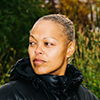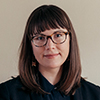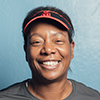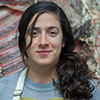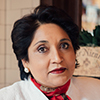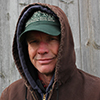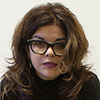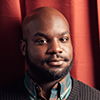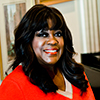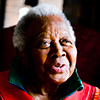



Corey, 31, was a Chicago native living in Maine and cooking at upscale sandwich shop Duckfat when she stepped out of the obscurity of the kitchen to compete on the Food Network reality series Chopped. She won. Now Corey is back in Chicago and, after two years of running the butchery program at Paul Kahan’s Publican Quality Meats, she recently replaced Chris Kuziemko as the restaurant’s chef de cuisine.
Interview by Gwynedd Stuart
Photos by John Sturdy

I grew up in Hyde Park. My mom works for the University of Chicago. She’s a surgeon. My father passed away when I was, like, three. I really got the full city experience growing up. I was exposed to a bunch of diverse kinds of food. My mom was working a lot of hours, so she didn’t really cook. We went to Chinatown all the time, we would go out for Thai.
I loved the city, but I did move to Maine for about nine years to get the other side. I had glorified memories of summer camp in Michigan, and I really liked the woods, and so I went to college at Bowdoin in Brunswick, Maine.
After college I was working in Chicago teaching pre-K and art at the Latin School and cooking at Mon Ami Gabi. I was 22 or 23. I got my start cooking by being really annoying. I was hostessing to make extra money because teaching doesn’t pay very well. The chef at Mon Ami—literally, I would just bother him all the time, like, “I wanna cook, I wanna cook.” I had to wear heels as a hostess, and they looked at me like, no way are you going back there. I was really persistent, and I continue to be persistent. And you know, he let me go back there and it just kinda clicked right away.

Working two jobs, I was completely losing my mind and was getting burned out on the city. I had friends of the family I babysat for in college. I called them and they were like, “You know, there’s this great farm that we’re rebuilding, and they take interns.” I was reading Sandor Katz’s The Revolution Will Not Be Microwaved—a great, great book—and I was like, screw it, I’m moving to a farm. My city friends thought I was nuts.
The farm was called New Leaf. I lived in a yurt. I kind of went from the ground up. They delivered product to Fore Street in Portland, Maine, which is a really renowned restaurant. The chef, Sam Hayward, he’s a Beard Award winner. I had the pleasure of working with him for about two years. And after working with all that great product, since I never went to culinary school, I really wanted to learn more refined technique. Duckfat’s Rob Evans, another great Portland chef, took me on. He had worked for [Thomas] Keller, so he was very technique- and product-driven. I probably would have stayed if not for the fact that on a trip home I met someone who drew me back to Chicago.


Eventually I was running Duckfat for Rob. I was 26 or 27. One night at the end of the company Christmas party, he’s like, “I have to do this thing tomorrow, you should do this thing with me. You should do this show Chopped.” I was like, “No way.” And he was like, “Nope, you’re doing it.” At first I was really reluctant, and then the women doing the casting came and they ate at the restaurant and they were so effusive and they were trying to get more women to do the show. As much progress as women have made in kitchens, it’s still not always 50-50. Especially when you get to the higher levels.
I’m a good student, so I watched, like, 50 episodes because I don’t like losing—especially when I’m being filmed. I was up against all men. They were all quite a bit older, and I think I surprised every single one of them. The guy who made it to the end with me made some comment, like, “I can’t believe I’m going up against her.”
Rob was gracious enough to give me some time off in the winter, and I went and did 25 different stages [unpaid internships for cooks and chefs]. Masa Miyaki has a couple of restaurants in Portland that are really great, I did some there. Then I came back to Chicago and did a bunch here. My best friend was living in Madrid; I was hoping to stage over there, but bringing knives to Europe is a little more difficult. So we just ended up eating. We wandered around Madrid, other parts of Spain, we wandered around Italy, we ate a lot of food.

I’d staged at the Publican, but they didn’t have any management positions at the time. Chris Pandel did at the Bristol, and I took it. And then, actually, Cosmo [Goss] remembered me fondly and they had something open up. He convinced me to come do a stage for a butcher and see where it might go.
I told Cosmo, “I haven’t broken down a cow, I’ve done some pigs, but I have really great knife skills.” It takes attention to detail because, especially with these products that are so lovingly delivered to us, we don’t want to waste anything. Sometimes people want to rush through butchering. These animals are expensive, they’re loved, and we want to pay attention and not tear through them. It’s fun once you know the muscle groups. Breaking down beef, pigs, lamb, you see that they’re all the same.
I’m still doing butchering. Everyone does it and everyone wants to, and it’s a great skill to know. I do a lot more now [as chef de cuisine], but I still enjoy doing the butchering.



